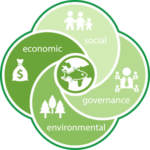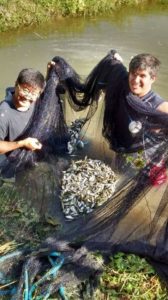Impacting the Sustainability of Fish Farming through Increased Governance: Small Farms, Big Change
Editor’s note: The following is a guest blog post by one of GAA’s 30 Under 30 members, Fernando H. Gonçalves. Fernando has a doctorate in sustainable aquaculture from Sao Paulo State University. He worked as the executive director of fisheries and agriculture in a municipality in Sao Paulo, Brazil. He currently lives in the United States, performing several research projects for publication. This is the second post in a five-part series by members of the 30 Under 30.

What is the first thing you think of when you hear the word sustainability? For most people, it is probably protection of the environment. However, especially for fish farming production, sustainability is not limited to the consideration of the environment. It must also be economically profitable, socially inclusive to generate employment opportunities and have good governance to suit the taxes, regulations and services, so that the business is able to sustain itself through the years.
For my doctorate, I studied a method to measure the sustainability of different production systems, comparing low-, medium- and high-technology use in baitfish farms. Unsurprisingly, the most sustainable farms were the large scale ones that invested in the use of more technology to perform the reproduction in a laboratory and maintain better control of the production. However, the number of farms with these features is few. The majority of farms are small in scale, lacking technical assistance and public policies to develop the industry. Large-scale farmers have access to a larger number of resources and they are able to build better relationships with policy makers and regulators, thereby improving their governance. Small scale farmers are usually more isolated, lack training, technical support and an easy path to access grant funding. However, they are the ones who provide diversity to food production and the majority of aquaculture production comes from these self-employed entrepreneurs.
Small Farms, Big Change
Although large scale farms play a very important role in food production, it would be more sustainable for countries that wish to develop their aquaculture industry to focus on increasing the professionalism of small scale farms. Large farms will always have an advantage over their smaller counterparts, so how do we close the gap? Improvement in the governance where it matters: the small fish farms.
 The lack of technical assistance is problematic in many areas around the globe, especially in developing countries. Most of the current regulations are focused on punishment for negative environmental impacts or impose taxes that affect the growth of the industry. What if research was more carefully considered in the development of regulations? What if the regulations gave new opportunities for income based on policies to reward environmental services that aquaculture may provide?
The lack of technical assistance is problematic in many areas around the globe, especially in developing countries. Most of the current regulations are focused on punishment for negative environmental impacts or impose taxes that affect the growth of the industry. What if research was more carefully considered in the development of regulations? What if the regulations gave new opportunities for income based on policies to reward environmental services that aquaculture may provide?
Currently, there is an effort to increase compliance with sustainable practices for fish farming by means of regulatory incentives through eco-labeling. This practice of labeling food, as sustainable to increase market approval, can be confusing and ineffective at encouraging smaller farmers to adapt sustainable practices who do not deal with public consumption in the food market.
Methods of Increased Governance
The sustainability of fish farming can be improved through increased governance. The negotiation of better laws and regulations can positively impact the field through remuneration of farmers, for the following practices: for increasing their level of vocational training, forming co-ops/associations, and rewarding good practices through a nutrient credit system.
Education for small farmers will help them be more professional and efficient, teaching them how to utilize technology and results of research to understand best practices in the industry, which will lead to less waste of time and resources. Programs such as Best Aquaculture Practices certification (BAP), which are growing in popularity, can be used to standardize farming practices. Laws that reward these certification processes can stimulate the farmers to pursue further vocational training.
 Co-operatives share knowledge, pool resources and establish trust which amplifies social capital for the farmers. Organized associations of farmers have more bargaining power to broker deals with other industries and the lawmakers if they unify.
Co-operatives share knowledge, pool resources and establish trust which amplifies social capital for the farmers. Organized associations of farmers have more bargaining power to broker deals with other industries and the lawmakers if they unify.
Lastly, a nutrient credit bank, modeled after the carbon credit system for global industry, can lead to monetizing effluents treatment from environmental services provided from fish farming, which would increase sustainable practices, as well as finance smaller operations through transactions/credit trades with the bigger producers. Nutrient trading credits, as encouraged by Dr. Thierry Chopin from the University of New Brunswick-Saint John, may be a milestone for stimulating the adoption of good practices by farmers and reward services such as water quality improvements through bio-filtration in integrated multi-trophic aquaculture.
This type of policy can be implemented on either a state or national level, which mitigates the difficulties faced by critics of the carbon credit market on a global scale. Making fish farming more sustainable through changes on a smaller scale can be extremely effective as we “act locally thinking globally.” A governance overhaul marries policy and science to put research to practical use to serve the whole productive chain and as much farmers as possible.
The future of sustainable fish farming is widening the scope beyond the big farmers. Increasing communication, partnerships, co-operatives, opening doors and shaking hands is paramount in ultimately gaining recognition of science by the world’s political powers to put money behind laws and projects. Alliances at the local level can lead the way for global impact. Establishing good governance is imperative to improve the sustainability of fish farming and protect our natural resources for generations to come.



